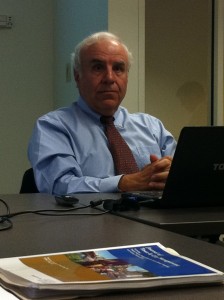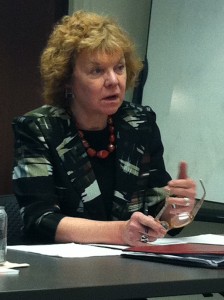WASHINGTON — Hydraulic fracturing to access natural gas should be slowed and eventually stopped, two Cornell University professors who have studied the technology said Monday during briefings for U.S. lawmakers.
Professors Anthony Ingraffea and Susan Christopherson of Cornell University said hydraulic fracturing, also called fracking, puts a large amount of American’s underground water at risk and quickens the pace of climate change because of methane emission.
They presented their studies publicly before a series of Capitol Hill briefings Monday. The U.S. Department of Interior and the Environmental Protection Agency recently proposed new regulations to control pollution and address public concerns.
Fracking is a process that involves injecting water, sand and chemicals underground to extract natural gas.
Ingraffea, citing the example of Marcellus Wells, a natural gas-rich formation stretching from upstate New York to West Virginia, Kentucky and Ohio, said underground water is at risk in the event of a chemical leak caused by fracking.
“No company can guarantee that any well they drill can never leak,” he said.
Oil and natural gas industries have said that there has rarely been leakage because of technological advances in drilling.
Ingraffea also said fracking won’t reduce greenhouse gases because methane, a much more potent greenhouse gas than carbon dioxide, can be inadvertently emitted during the process.
Oil and gas industry officials dispute the credibility of Ingraffea’s work. Energy in Depth, an industry group formed by the Independent Petroleum Association of America, said in an online statement that his work isn’t “even close to being correct.”
“Hydraulic fracturing is a game changer for the United States,” said Reid Porter, with the American Petroleum Institute, “It [Ingraffea’s work] is full of contradictions.”
But Christopherson said fracking’s effects go beyond the well pad, hurting other industries and communities. For instance, wineries in New York have voiced concerns about fracking’s potential risk to water sources, she said.
“There is widespread concern about the impact of shale gas drilling on people’s quality of life,” she said.


